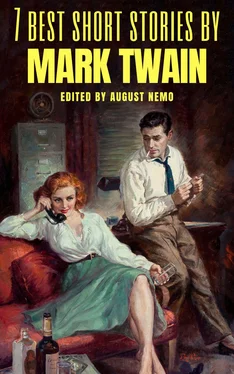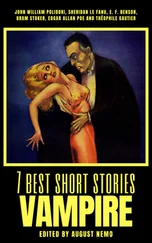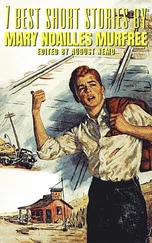Mark Twain describes his adventures as a Mississippi pilot as though he had been a boy of about seventeen at the time, whereas in fact he was a young man of nearly thirty. There is a reason for this. The same part of the book describes his exploits in the Civil War, which were distinctly inglorious. Moreover, Mark Twain started by fighting, if he can be said to have fought, on the Southern side, and then changed his allegiance before the war was over. This kind of behaviour is more excusable in a boy than in a man, whence the adjustment of the dates. It is also clear enough, however, that he changed sides because he saw that the North was going to win; and this tendency to side with the stronger whenever possible, to believe that might must be right, is apparent throughout his career. In Roughing It there is an interesting account of a bandit named Slade, who, among countless other outrages, had committed twenty-eight murders. It is perfectly clear that Mark Twain admires this disgusting scoundrel. Slade was successful; therefore he was admirable. This outlook, no less common today, is summed up in the significant American expression 'to Make Good.'
In the money-grubbing period that followed the Civil War it was hard for anyone of Mark Twain's temperament to refuse to be a success. The old, simple, stump-whittling, tobacco-chewing democracy which Abraham Lincoln typified was perishing: it was now the age of cheap immigrant labour and the growth of Big Business. Mark Twain mildly satirized his contemporaries in The Gilded Age, but he also gave himself up to the prevailing fever, and made and lost vast sums of money. He even for a period of years deserted writing for business; and he squandered his time on buffooneries, not merely lecture tours and public banquets, but, for instance, the writing of a book like A Connecticut Yankee in King Arthur's Court, which is a deliberate flattery of all that is worst and most vulgar in American life. The man who might have been a kind of rustic Voltaire became the world's leading after-dinner speaker, charming alike for his anecdotes and his power to make businessmen feel themselves public benefactors.
It is usual to blame Mark Twain's wife for his failure to write the books he ought to have written, and it is evident that she did tyrannize over him pretty thoroughly. Each morning, Mark Twain would show her what he had written the day before, and Mrs. Clemens (Mark Twain's real name was Samuel Clemens) would go over it with the blue pencil, cutting out everything that she thought unsuitable. She seems to have been a drastic blue-penciller even by nineteenth-century standards. There is an account in W.D. Howells's book My Mark Twain of the fuss that occurred over a terrible expletive that had crept into Huckleberry Finn. Mark Twain appealed to Howells, who admitted that it was 'just what Huck would have said', but agreed with Mrs. Clemens that the word could not possibly be printed. The word was 'hell'. Nevertheless, no writer is really the intellectual slave of his wife. Mrs. Clemens could not have stopped Mark Twain writing any book he really wanted to write. She may have made his surrender to society easier, but the surrender happened because of that flaw in his own nature, his inability to despise success.
Several of Mark Twain's books are bound to survive, because they contain invaluable social history. His life covered the great period of American expansion. When he was a child it was a normal day's outing to go with a picnic lunch and watch the hanging of an Abolitionist, and when he died the aeroplane was ceasing to be a novelty. This period in America produced relatively little literature, and but for Mark Twain our picture of a Mississippi paddle-steamer, or a stage-coach crossing the plains, would be much dimmer than it is. But most people who have studied his work have come away with a feeling that he might have done something more. He gives all the while a strange impression of being about to say something and then funking it, so that Life on the Mississippi and the rest of them seem to be haunted by the ghost of a greater and much more coherent book. Significantly, he starts his autobiography by remarking that a man's inner life is indescribable. We do not know what he would have said—it is just possible that the unprocurable pamphlet, 1601, would supply a clue but we may guess that it would have wrecked his reputation and reduced his income to reasonable proportions.
All things change except barbers, the ways of barbers, and the surroundings of barbers. These never change. What one experiences in a barber's shop the first time he enters one is what he always experiences in barbers' shops afterward till the end of his days. I got shaved this morning as usual. A man approached the door from Jones Street as I approached it from Main -- a thing that always happens. I hurried up, but it was of no use; he entered the door one little step ahead of me, and I followed in on his heels and saw him take the only vacant chair, the one presided over by the best barber. It always happens so. I sat down, hoping that I might fall heir to the chair belonging to the better of the remaining two barbers, for he had already begun combing his man's hair, while his comrade was not yet quite done rubbing up and oiling his customer's locks. I watched the probabilities with strong interest. When I saw that No. 2 was gaining on No. 1 my interest grew to solicitude. When No. 1 stopped a moment to make change on a bath ticket for a new-comer, and lost ground in the race, my solicitude rose to anxiety. When No. 1 caught up again, and both he and his comrade were pulling the towels away and brushing the powder from their customers' cheeks, and it was about an even thing which one would say "Next!" first, my very breath stood still with the suspense. But when at the culminating moment No. 1 stopped to pass a comb a couple of times through his customer's eyebrows, I saw that he had lost the race by a single instant, and I rose indignant and quitted the shop, to keep from falling into the hands of No. 2; for I have none of that enviable firmness that enables a man to look calmly into the eyes of a waiting barber and tell him he will wait for his fellow-barber's chair.
I stayed out fifteen minutes, and then went back, hoping for better luck. Of course all the chairs were occupied now, and four men sat waiting, silent, unsociable, distraught, and looking bored, as men always do who are waiting their turn in a barber's shop. I sat down in one of the iron-armed compartments of an old sofa, and put in the time far a while reading the framed advertisements of all sorts of quack nostrums for dyeing and coloring the hair. Then I read the greasy names on the private bayrum bottles; read the names and noted the numbers on the private shaving-cups in the pigeonholes; studied the stained and damaged cheap prints on the walls, of battles, early Presidents, and voluptuous recumbent sultanas, and the tiresome and everlasting young girl putting her grandfather's spectacles on; execrated in my heart the cheerful canary and the distracting parrot that few barbers' shops are without. Finally, I searched out the least dilapidated of last year's illustrated papers that littered the foul center-table, and conned their unjustifiable misrepresentations of old forgotten events.
At last my turn came. A voice said "Next!" and I surrendered to -- No. 2, of course. It always happens so. I said meekly that I was in a hurry, and it affected him as strongly as if he had never heard it. He shoved up my head, and put a napkin under it. He plowed his fingers into my collar and fixed a towel there. He explored my hair with his claws and suggested that it needed trimming. I said I did not want it trimmed. He explored again and said it was pretty long for the present style -- better have a little taken off; it needed it behind especially. I said I had had it cut only a week before. He yearned over it reflectively a moment, and then asked with a disparaging manner, who cut it? I came back at him promptly with a "You did!" I had him there. Then he fell to stirring up his lather and regarding himself in the glass, stopping now and then to get close and examine his chin critically or inspect a pimple. Then he lathered one side of my face thoroughly, and was about to lather the other, when a dog-fight attracted his attention, and he ran to the window and stayed and saw it out, losing two shillings on the result in bets with the other barbers, a thing which gave me great satisfaction. He finished lathering, and then began to rub in the suds with his hand.
Читать дальше

![Коллектив авторов - Best Short Stories [С англо-русским словарем]](/books/26635/kollektiv-avtorov-best-short-stories-s-anglo-thumb.webp)










